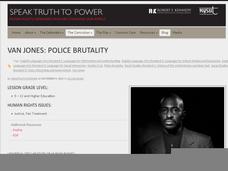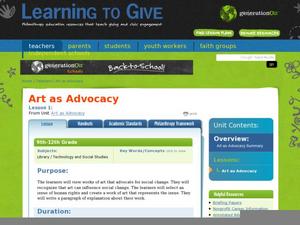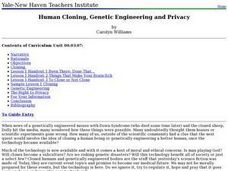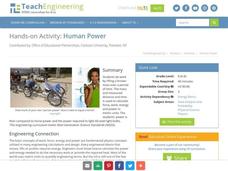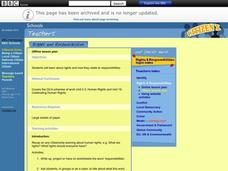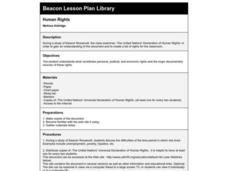Facing History and Ourselves
Eyes on the Prize Lesson 2: Six Steps for Nonviolent Social Change
Students explore the concept of nonviolent protest. For this Civil Rights lesson, students examine the attributes of nonviolent protest as they investigate the student protests that took place in Nashville in 1960-1961. Students reflect...
Robert F. Kennedy Center for Justice and Human Rights
Vaclav Havel: Free Expression
Develop an understanding of universal human rights, particularly the freedom of expression, with the questions and activities that analyze the conflicts of Vaclav Havel. Learners define, interpret and rephrase the human rights article in...
Robert F. Kennedy Center for Justice and Human Rights
Juliana Dogbadzi: Slavery/Trafficking
Progress your learners' comprehension of universal human rights by exploring the violation of human trafficking through the experiences of Juliana Dogbadzi. This activity analyzes and discusses very sensistive and graphic issues but is...
Robert F. Kennedy Center for Justice and Human Rights
Van Jones: Police Brutality
Develop an understanding of how the media and society are connected and responsible for the defense of universal human rights. Learners investigate and examine the conflicts of police brutality as it is portrayed in the media and through...
Curated OER
Art as Advocacy for Social Change
“Humanscape No.65” by Melesia Casas and Ester Hernandez’s “Sun Maid Raisins” launch a study of how works of art can advocate for social change. After examining these two works and discussing the human rights issues raised, class members...
Curated OER
Martin Luther King Jr. and Nonviolence
Using the book, Martin's Big Words, learners will discover the life of Dr. Martin Luther King Jr. Vocabulary is identified throughout the story by using several his famous protest speeches as examples. Class discussions on racism, during...
Personal Genetics Education Project
Genetics and Reproduction
Disease prevention or designer babies? Use a set of slides to introduce the growing practice of preimplantation genetic diagnosis, or PGD. Teens read related articles and then break into groups to address different scenarios. Afterward,...
Curated OER
In the 1960s, Why Were Boston’s Schools Racially Segregated?
Young scholars explore the implications of segregation. In this Civil Rights lesson, students investigate what equal education is as they discover the state of Boston schools in 1960. Young scholars define civil rights and discrimination...
United Nations
The UN: Working for Us All
The United Nation's role in world diplomacy is critical, but its enforcement is limited. Using activities such as role plays and simulations, classmates consider the role the UN plays in world peace keeping. The unit plan includes five...
Curated OER
Human Cloning, Genetic Engineering and Privacy
Review the aspects of human cloning and the moral issues associated with it. Individually, your students will keep a list of the articles related to this issue and research issues related to the ethic issues people are concerned with....
National Endowment for the Humanities
The Music of African American History
High schoolers examine role spirituals have played in African American history and religion, examine Harriet Tubman's use of spirituals in her work, explore power of spirituals in Civil Rights Movement, and work with oral tradition,...
Curated OER
Who Wants to be a Millionaire: Keeping Healthy
Has your class just finished learning about health, exercise, and nutrition? If they have, then they'll love playing this fun game that quizzes kids about keeping healthy. There are 15 questions that span eating right, the human body,...
Teach Engineering
Human Power
How many humans does it take to power a light bulb? The 10th part of a 25-lesson Energy Systems and Solutions unit has learners conduct an experiment to calculate power. They then use the results to determine how many classmates they...
Koshland Science Museum
Infectious Disease: Evolving Challenges to Human Health Middle School Virtual Field Trip
Is there one right way to control infectious diseases? Learners determine the facts each stakeholder must consider when making their recommendations for controlling a disease threatening their area. They take into account public health,...
Curated OER
Understanding the Body, Day 2: Puberty
What is puberty? Get your secondary special needs high schoolers on the right track with this develpmentally appropriate lesson. They define and describe the differences between men, women, boys, and girls, discuss major events that mark...
Reading Through History
The March on Washington
How does marching get a point across to the government? Teach pupils about civics, human rights, and freedom of speech using the resource about the March on Washington. After reading, learners complete multiple-choice and short-answer...
BBC
Rights and Responsibilities
Middle and high schoolers engage in a lesson plan about rights and responsibilities, and the differences between them. After a class discussion, pupils break off into pairs and come up with mimes that respect or abuse a specific right...
Curated OER
Human Rights
Third graders study The United Nations' Universal Declaration of Human Rights and Eleanor Roosevelt.
Curated OER
Put Your Hands in Mine: King Day
Middle schoolers examine the concepts of human and civil rights. In this philanthropy lesson, students watch The Mighty Times: The Children March. Middle schoolers discuss concepts relating to civil rights and change.
Curated OER
The Many Faces of Paul Robeson
Students discuss and construct timelines based on the life of author/performer/Civil Right's activist, Paul Robeson. They view photographs of him at various times in his life and discuss the roles he may have been playing at those times.
Curated OER
Mandela The Man
Ninth graders explore civil rights by reading several biographies. For this Nelson Mandela lesson, 9th graders discuss the trials and tribulations Nelson Mandela had to face in South Africa and how they were similar to the problems...
Curated OER
A Time for Justice
Students engage in a lesson that focuses on the development of The Bill Of Rights in the United States. They conduct research using a variety of resources. Students two focus questions in order to guide the information search. They state...
Curated OER
Lesson Plan on Indigenous Children
Students explore indigenous, traditional and tribal cultures--their rights, protections by law, and obstacles as a people. In groups, they form their own activist groups to contribute to the global effort to preserve indigenous cultures.
Curated OER
Lesson Plan on Poverty
Young scholars should walk away from this lesson with a greater understanding of poverty in America and the world and the impact it has on students around them. While young scholars have a right to life a good life and be free from...
Other popular searches
- Bill of Human Rights
- Human Rights Environment
- Human Rights Lesson
- Human Rights Poster
- Human Rights Violations
- Canadian Human Rights
- Declaration of Human Rights
- Human Rights Abuses
- Latin America Human Rights
- Human Rights Issue
- Human Rights Activists
- Human Rights Groups





